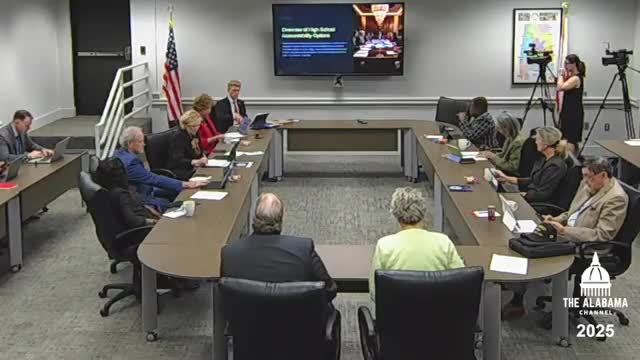Alabama panel backs pursuing federal waiver to include WorkKeys alongside ACT in high‑school accountability
Get AI-powered insights, summaries, and transcripts
Subscribe
Summary
State education leaders told the Alabama State Board of Education they plan to seek a U.S. Department of Education waiver to allow Career Readiness measures from ACT WorkKeys to count alongside the ACT in high‑school accountability calculations, and discussed timing, participation and implementation challenges.
Alabama education officials and a superintendent-led task force told the State Board of Education on Tuesday that they plan to apply for a waiver from the U.S. Department of Education to allow the state to treat ACT WorkKeys results as an alternative pathway for measuring postsecondary success in high‑school accountability.
The committee chair, Anne Jackson, superintendent, told the board the group focused on high school assessments first and evaluated several options, including a diploma pathway (option b), an expanded ACAP model and end‑of‑course testing. The group concluded the newly available federal waiver makes a mixed model that pairs the ACT with WorkKeys the most practical near‑term change.
Board members and staff said the proposed approach would keep the ACT as Alabama’s foundational assessment — administered to all juniors — while allowing WorkKeys to serve as an achievement/proficiency measure for students who are pursuing career pathways. That could allow more schools to earn credit in accountability calculations for students who demonstrate workplace skills through WorkKeys even if those students are not scoring at college‑ready levels on the ACT.
Jackson said the task force evaluated options with pros and cons and that the waiver opened a realistic route to “give voice and credence to our career readiness students” by treating career readiness and college readiness with comparable weight in reporting. Angela Martin and Shantia Washington, Alabama State Department of Education staff, provided legal and technical guidance to the committee, Jackson said, and ACT provided data modeling on how mixing ACT and WorkKeys scores would affect school results.
Board members pressed staff on rigor and comparability. Board member Miss West asked whether WorkKeys is sufficiently rigorous for students entering the workforce or dual‑enrollment paths; the conversation included a description of WorkKeys’ three domains (applied math, workplace documents and graphic literacy) and the panel said WorkKeys measures work readiness rather than college readiness. Jackson and other presenters said WorkKeys is not intended to indicate college readiness but that WorkKeys silver/gold/platinum designations correlate with higher wages nationally and would give schools credit for students on career pathways who currently do not contribute to the report‑card proficiency totals.
Officials noted implementation challenges: if the waiver is granted, every student would still take the ACT; to align reporting periods, most students likely would need to take both ACT and WorkKeys in their junior year so results can be used in the same accountability calculation. Staff estimated roughly 15,000 students currently do not take WorkKeys in its present senior‑year administration and would need to participate if the waiver required universal testing. Jackson said the change would likely shift WorkKeys from senior to junior year and that the waiver process could take several months.
Timing and rollout questions remained. Board members were told a waiver application and public‑notice period are required but do not require a board vote to file; if approved and implemented, the earliest affected report card would reflect the 2026‑27 school year and appear in the 2027 report card. Jackson and staff said the waiver application process can include negotiation with the U.S. Department of Education and that other states are watching Alabama, because Alabama was an early adopter of ACT as the statewide assessment and would be among the first to adopt a mixed delivery accountability model.
Board members asked about unintended incentives: one board member said the current diploma option structure could create incentives for schools or counselors to steer students into credential pathways in ways that affect accountability. Jackson said the proposed mixed model would remove some incentives to exclude students from accountability calculations because “everybody would take everything.”
Members also asked how schools would keep both cohorts engaged in tests that some students or families view as irrelevant to their chosen path. Presenters acknowledged students sometimes do not take one or the other test seriously, and that remains a concern whether students are college‑bound or career‑bound. The presenters said district leaders and schools will need to plan communications and supports to improve participation and test integrity.
The board did not vote on the waiver application during the meeting; staff said they will publish a notice seeking a waiver and begin the public comment process and further negotiations with the Department of Education. The board asked for ongoing updates about waiver progress and implementation details, including testing windows, participation rates and any federal conditions attached to approval.
